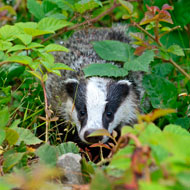Cull may not reduce TB, chief vet admits

Just 274 badgers were culled in Gloucestershire, less than half of the minimum target of 615.
Pilot badger culls in Gloucestershire may not reduce TB in cattle, the UK's chief veterinary officer has admitted. Despite this, he has advised the culls should continue in 2015.
For the second year running, cull companies have fallen short of their target. According to government estimates, a minimum of 615 badgers should have been culled in West Gloucestershire to offer disease benefits to cattle. Yet only 274 badgers were culled - less than half of the target.
Chief vet Nigel Gibbens said: "Given the lower level of badger population reduction in the the Gloucestershire cull area over the past two years, the benefits of reducing disease in cattle over the planned four-year cull may not be realised there."
However, Mr Gibbens said culling should continue there in 2015 and at least one subsequent year, assuming there are "reasonable grounds for confidence" that efficacy can be improved.
Furthermore, Mr Gibbens even suggested culling should be repeated in the area beyond 2017. "As there has been a slow start," he said, "we should consider whether culling should be repeated in future years beyond 2017 in order to increase the likelihood of reduced disease in cattle."
In West Somerset - the second cull area - a total of 341 badgers were culled, just over the minimum target of 316.
Mr Gibbens said the culls should continue for at least two more years in West Somerset: "The outcome of this year's cull in Somerset indicates that industry-led culling can, in the right circumstances, deliver the level of effectiveness required to be confident of achieving disease control benefits," he said.
However, the Humane Society's UK veterinary advisor Professor MacMillan has urged Defra to reconsider, saying he "simply disagrees" with Mr Gibbens. "Even on the basis of extremely dubious estimates of badger populations, Defra has failed to reach its target in one area and only just exceeded it in the other.
"The method of culling has not been shown to be humane in my opinion, and Defra's refusal to expose its data to independent analysis is an implicit admission of this. The ethics of persisting with a policy that causes animals to suffer unnecessarily and is ineffective in reducing TB in cattle must be questioned."
Meanwhile, the National Farmers Union has called for a further roll-out of the cull to new areas. President Meurig Raymond said: "There are many other areas where bTB is rife and is having a massive impact on farming family businesses which would benefit from the roll out of culling badgers."



 The Veterinary Medicines Directorate (VMD) is inviting applications from veterinary students to attend a one-week extramural studies (EMS) placement in July 2026.
The Veterinary Medicines Directorate (VMD) is inviting applications from veterinary students to attend a one-week extramural studies (EMS) placement in July 2026.